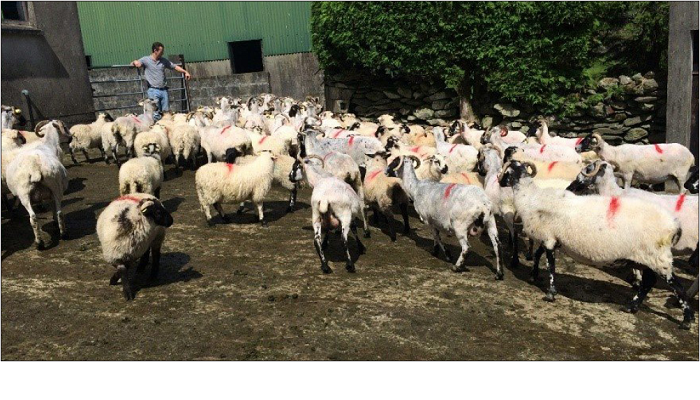06 November 2021
Focus on ewe body condition score sees lamb numbers up in West Cork

Denis O’Riordan, a BETTER Sheep farmer, farms approximately 280 hectares (690 acres) of hill & lowland in West Cork, with his wife Esther, daughters Abbie, Roísín & Órlaith, and his uncle, Donie O’Connor. Michael Gottstein, Teagasc Head of Sheep KT outlines the benefits of the 2021 farm practices
Denis O’Riordan farms approximately 280 hectares (690 acres) of hill and lowland with his wife Esther, daughters Abbie, Roísín and Órlaith, and his uncle, Donie O’Connor, from whom he inherited the farm.
The main block is situated in Borlin, West Cork with a second out farm consisting of 8.4 hectares (21 acres) of good quality lowland approximately 18km distant. The main block consists of approximately 260 hectares (648 acres) of privately-owned hill including Cnoc Bui, which at 706m is the highest mountain peak in Cork. Approximately 60 hectares (150 acres) is enclosed. In addition to the hill grazing there is approximately 8 hectares (20 acres) of improved ground of which about 2 hectares (5 acres) could be mowed for silage.
Mating begins mid-November
Denis runs a hill sheep enterprise consisting of 350 Scottish Blackface and Swaledale ewes being put to the ram annually. Approximately 70 Scottish Blackface and Swaledale ewe lambs are retained as replacements annually. Two thirds of the ewes are put to either Scottish Blackface and Swaledale rams with the remaining one third crossed with either Suffolk or Bluefaced Leicester rams.
Mating begins between November 12 and 14 and the ewes are given five weeks with the rams on the enclosed ground before rams are removed and the ewes return to the hill, usually around December 20 annually.
A focus on ewe body condition score (BCS) since joining the BETTER farm programme has resulted in improvement in ewe condition and a big reduction in the percentage of ewes in BCS, less than 2.5. This has increased pregnancy rate and the number of lambs produced annually.
This year all lambs were all sold as stores with no concentrate feed given to lambs.
Ninety per cent of the lambs (excluding replacements retained) have been sold with prices ranging from €72-€100 per head.
Pure hill lambs made €72 for males and €100 for surplus females. Cross bred lambs averaged around €90 per head.
There are approximately 40 lambs left to sell. These are on good grass and have not received any concentrate supplementation and will be sold in the coming weeks.
Draft hill ewes are sold to local farmers for further breeding on lowland farms and cull ewes are sold to a local factory agent.
A small number of store lambs were sold through the local mart with the remainder being live weighed and sold from home.
Flock Health
Flock health plays a big role on all sheep farms. Denis carries out regular faecal egg counts on lambs to ascertain stomach worm burdens.
This year lambs have only been treated twice for stomach worms (May and July). Ewes have been treated for liver fluke in early September with a Rafoxanide based flukicide.
Denis will be taking faecal samples from ewes in the next week or so to ascertain if they have active mature fluke present and will then make a decision as to whether a second liver fluke dose will be required this year.
A small herd of suckler cows is also kept on the main block. Six cows will be kept over the winter period. The cows are a mixture of Angus, Hereford and Limousin crosses that are mated to a Charolais bull.
Cows calve in the spring and calves are sold as weanlings each autumn through Kenmare mart. This year’s calves averaged around €850 each.
Winter forage consists of home-grown baled silage. In the coming weeks, Denis will be taking silage samples and getting them analysed to assess the quality and feeding value of this year’s crop.
Based on the results, a winter feed plan will be drawn up to plan when and to category of stock the various batches of silage will be fed.
The best quality silage will be retained for feeding to ewes pre lambing.
Demonstration farm in the Signpost Programme
Denis O’Riordan has recently agreed to participate as a demonstration farmer in the Signpost Programme . This is a programme designed to support farmers to farm more sustainably.
Last month, Denis and his Teagasc adviser, Michael Connolly, together with the team from the BETTER Farm Sheep Programme looked at various practices that gaseous emissions and nutrient losses, as well as to manage and enhance biodiversity and reduce costs on the holding.
A sustainability plan has been drawn up to allow Denis to farm in a more sustainable fashion and future-proof his farm against future policy and market requirements.
Find out more here about the BETTER Farm Sheep Programme and about the Signpost Programme here
